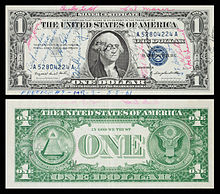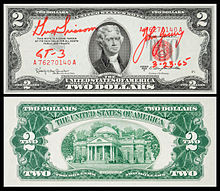NASA space-flown Gemini and Apollo medallions
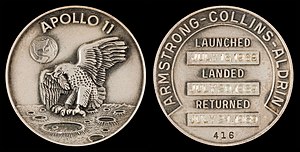
NASA space-flown Gemini and Apollo medallions were mission-specific commemorative medallions, often astronaut-designed, which were approved by NASA and carried aboard the mission spacecraft into orbit. Beginning with the first crewed Gemini mission in 1965, commemorative medallions were prepared for the astronauts at their request. These were produced by a company only known as Fliteline and were struck either in a pewter-colored base metal, sometimes painted a gold color, or sterling silver, and were flown on all 10 crewed Gemini missions. A Fliteline medallion was designed and produced for Apollo 1, but was never officially flown after a disastrous cabin fire during a launch rehearsal killed the flight crew.
The Robbins Company of Attleboro, Massachusetts, was contracted in 1968 to produce commemorative medallions beginning with Apollo 7, the first crewed Apollo flight since the Apollo 1 disaster. These were purchased by astronauts and support crew personnel at NASA Astronaut Flight Office, and a total of over 3,000 sterling silver Robbins medallions were flown into space across the 12 crewed flights of the Apollo program. Some of these were later sold in public auction for up to $60,000. The basic elements of the medallion design are consistent throughout the 12 medallions in the series, with the main design element and the mission name on the obverse, mission dates on the reverse, primary flight crew names on either the obverse or reverse, and a serial number either on the lower reverse or on the rim. A very small number of Apollo Robbins medallions were also struck in 14k gold, generally ordered by the mission crew as a personal memento. Sterling silver Robbins medallions have continued to be struck for every crewed NASA spaceflight, including Skylab and Space Shuttle missions.[1][nb 1]
Space-flown numismatic items
[edit]Numismatic souvenirs have accompanied astronauts on nearly every early spaceflight.[3] Mercury astronauts carried small light-weight mementos on their missions, often in the form of US coins or banknotes. On the first sub-orbital flight (Mercury-Redstone 3), Alan Shepard carried with him four one-dollar silver certificates which were subsequently signed by him, other Mercury astronauts, and support staff becoming short snorters. A number of Mercury dimes were flown aboard Mercury-Redstone 4 in 1961, being recovered with the capsule from the Atlantic Ocean in 1999.[4][5] John Glenn, piloting the first crewed U.S. orbital spaceflight Mercury-Atlas 6 also carried several one-dollar silver certificates.
Space-flown numismatic items are also known for early Gemini missions. On the first crewed Gemini flight (Gemini 3), Grissom and Young brought 50 two-dollar bills.[6] Young also made history for smuggling "contraband" on board the flight, in the form of a corned-beef sandwich.[7][8][9] Other currencies have been taken to space as well; in 2014, Chris Hadfield made history with the first unveiling of a new currency design in space when he revealed the new design for the Canadian five-dollar note aboard the International Space Station.[10]
Gemini mission space-flown Fliteline medallions
[edit]Beginning with the first crewed Gemini mission in March 1965, commemorative medallions were prepared for the astronauts at their request. It is unclear who prepared these early medallions, only that each individual box containing a medallion bore the word "Fliteline".[11] It is unknown how many gold and silver colored medallions were prepared for each mission, and how many were space-flown versus unflown. Fliteline medallions were prepared for each of the crewed Gemini flights, as well as the ill-fated Apollo 1 mission.
| Mission | Date[nb 3] | Medallion | Size | Provenance[nb 4] |
|---|---|---|---|---|
23 Mar 1965
|
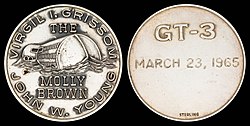
|
26 mm (1.0 in)
|
Gordon Cooper[12] | |
3 Jun 1965
7 Jun 1965 |
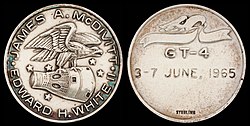
|
25 mm (0.98 in)
|
Ed White[13] | |
21 Aug 1965
29 Aug 1965 |
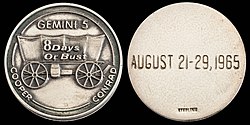
|
25 mm (0.98 in)
|
Not reported[14] | |
15 Dec 1965
16 Dec 1965 |
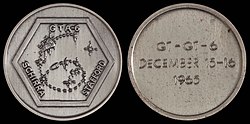
|
25 mm (0.98 in)
|
Wally Schirra[15] | |
4 Dec 1965
18 Dec 1965 |
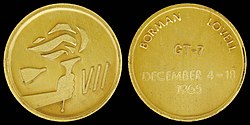
|
25 mm (0.98 in)
|
Frank Borman to Joe Garino[16][17] | |
16 Mar 1966
17 Mar 1966 |
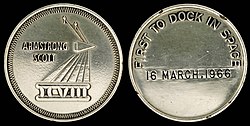
|
25 mm (0.98 in)
|
David Scott to Joe Garino[17][18] | |
3 Jun 1966
6 Jun 1966 |

|
30 mm × 20 mm (1.18 in × 0.79 in)
|
Gene Cernan[19] | |
18 Jul 1966
21 Jul 1966 |
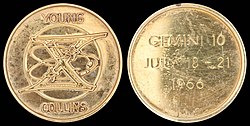
|
25 mm (0.98 in)
|
John Young[20] | |
12 Sep 1966
15 Sep 1966 |
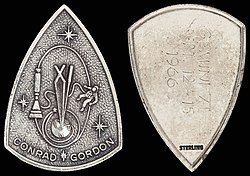
|
20 mm × 30 mm (0.79 in × 1.18 in)
|
Jack Lousma[21] | |
11 Nov 1966
15 Nov 1966 |
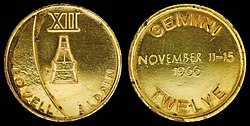
|
25 mm (0.98 in)
|
Jim Lovell to Joe Garino[17][22] |
Apollo mission space-flown Robbins medallions
[edit]The Robbins Company was founded in 1892 by jeweler Charles M. Robbins, in Attleboro, Massachusetts.[23] They began designing and producing commemorative badges for Ohio in 1913,[24] and South Dakota in 1917.[25] In 1935, the first 1,000 badges of a new design for the Federal Bureau of Investigation were produced by Robbins.[26] The Robbins Company also struck the Olympic medals for the 1932 Winter Games in Lake Placid, New York.[23]
Robbins medallions
[edit]The Apollo 1 cabin fire in January 1967 put crewed spaceflight on hold. The crew of Apollo 7, designated to be the return to crewed spaceflight, began working with the Robbins Company later in 1967 to produce commemorative mission medallions.[11][27] Commissioned by the NASA Astronaut Flight Office (AFO), the medallions were financed entirely through the orders placed by astronauts and support crew personnel.[27][28] Only those directly affiliated with the AFO were eligible as purchasers,[29] and they were bound by their employment contract not to commercialize the medallions,[30] as NASA was concerned about any appearance that the astronauts might profit from the flown medallions.[31]
One (or more) of the astronauts from the flight crew worked directly with the Robbins Company to design the mission medallion.[27] The basic elements of the medallion design are consistent throughout the Project Apollo series. The main design element along with the mission name is located on the obverse. The names of the flight crew can be found on either the obverse or reverse. The mission dates are located on the reverse. Beginning with Apollo 11, special fields were designed for the reverse of the medallion that allowed for engraved dates of launch, lunar landing, and return. Also on the reverse (or sometimes the edge) is the medallion serial number. The size of most Robbins Apollo medallions falls roughly between a current US quarter (24.3 mm (0.96 in)) and a Kennedy half dollar (30.6 mm (1.20 in)).
The medallions were struck in sterling silver two to three months prior to the scheduled mission, though it is unclear whether serial numbers were added pre or post-flight.[31] The medallions were stored in the Command Service Module during flight and on missions involving a lunar landing, a small number were brought to the lunar surface aboard the Lunar Module.[31] The flown medallions were returned to the Robbins Company after the flight to have the dates engraved and for a final polishing.[31] Except where noted, all medallions struck for Apollo 7–14 were flown,[32] and serial numbers for Apollo 14–17 medallions appear on the rim.[33]
For Apollo 13 due to the accident during the mission and the last minute crew change of Jack Swigert replacing Ken Mattingly three days prior to launch, the Apollo 13 Robbins medallions flown aboard the mission were melted down and reminted after the mission to reflect the correct crew, and the absence of a lunar landing date.[34]
Apollo Robbins medallions were also struck, in very small numbers, in 14k gold.[35][nb 5] These medallions were generally ordered by the mission crew as a personal memento of their flight and were often taken to the lunar surface in the Landing Module.[37] For the duration of the Apollo program, Robbins medallions (3–7 gold and 80–450 silver per mission) were flown into space.[11][36][38]
| Mission | Date[nb 3] | Medallion | No. flown (struck) [nb 7] |
Size | Design | Provenance[nb 4] |
|---|---|---|---|---|---|---|
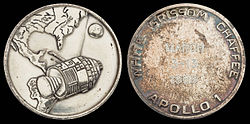
|
8
(unk) |
31 mm (1.2 in)
|
Unknown | [nb 9] | ||
11 Oct 1968
22 Oct 1968 |
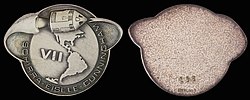
|
255
[nb 10] |
32 mm (1.3 in)
|
Walter Cunningham[41] | Rusty Schweickart[42] | |
21 Dec 1968
27 Dec 1968 |
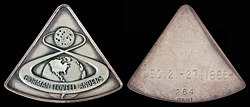
|
300
|
38 mm × 30 mm (1.5 in × 1.2 in)
|
Jim Lovell[43] | Rusty Schweickart[44] | |
3 Mar 1969
13 Mar 1969 |
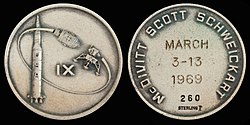
|
350
|
25 mm (0.98 in)
|
McDivitt, Scott, Schweickart[45] | Jim McDivitt (Crew Commander), presented to Wally Schirra[46] | |
18 May 1969
26 May 1969 |
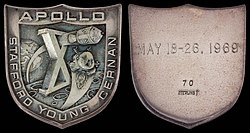
|
300
|
29 mm × 31 mm (1.1 in × 1.2 in)
|
Stafford, Young, Cernan[47] | Rusty Schweickart[48] | |
16 Jul 1969
20 Jul 1969 24 Jul 1969 |
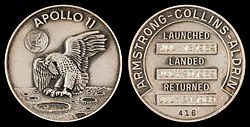
|
28 mm (1.1 in)
|
Michael Collins[49] | Neil Armstrong (Crew Commander), presented to Wally Schirra[50] | ||
14 Nov 1969
19 Nov 1969 24 Nov 1969 |
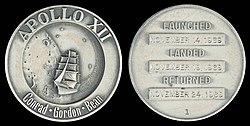
|
262
[nb 12] |
32 mm (1.3 in)
|
Unknown[52] | Pete Conrad (Crew Commander[broken anchor]), presented to Jim Rathmann[53] | |
11 Apr 1970
abort 17 Apr 1970 |
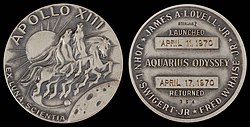
|
400
[nb 13] |
32 mm (1.3 in)
|
Apollo 13 crew with Lumen Martin Winter[55] | Rusty Schweickart[56] | |
31 Jan 1971
5 Feb 1971 9 Feb 1971 |
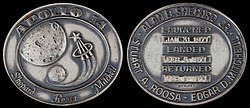
|
303
|
35 mm × 30 mm (1.4 in × 1.2 in)
|
Apollo 14 crew with Jean Beaulieu[57][nb 14] | Rusty Schweickart[58] | |
26 Jul 1971
30 Jul 1971 7 Aug 1971 |
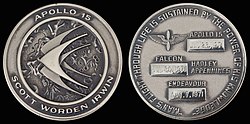
|
35 mm (1.4 in)
|
Based on a design by Emilio Pucci[61] | Rusty Schweickart[62] | ||
16 Apr 1972
20 Apr 1972 27 Apr 1972 |
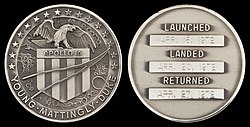
|
98
(300) |
35 mm (1.4 in)
|
Apollo 16 crew with Barbara Matelski[63][nb 17] | John Young (Crew Commander)[64] | |
7 Dec 1972
11 Dec 1972 19 Dec 1972 |
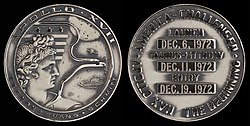
|
80
(300) |
35 mm (1.4 in)
|
Apollo 17 crew[65] | Unknown | |
15 Jul 1975
24 Jul 1975 |
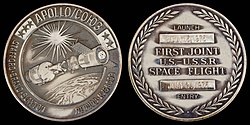
|
93
(192) |
35 mm (1.4 in)
|
Unknown | Rusty Schweickart[66] |
Robbins Apollo medallions at auction
[edit]Despite the NASA prohibition on commercializing the medallions, since 1995 there have been over 500 internet or live auction appearances of Apollo mission Robbins medallions.[67] Two auction companies account for a majority of the sales: Heritage Auctions (over 200 since 2007)[68] and RR Auction (over 100 since 2011).[69] Between both auction companies, the top 10 prices realized range from US$30,000 to nearly $62,000, all for sterling silver medallions from either Apollo 11 or Apollo 17.[70][71] A gold Robbins medallion from the Apollo 11 mission that belonged to astronaut Neil Armstrong sold for over $2 million in July 2019.[72]
References
[edit]Footnotes
[edit]- ^ Robbins medallions were also struck for the crews of the Expeditions to the International Space Station. Medallions for the first nine expedition crews (2000–04) have been documented.[2]
- ^ All of the Fliteline medallions illustrated in the table are space-flown and their individual histories can be seen under the provenance column notes.
- ^ a b Launch and return dates are listed for Gemini and early Apollo missions. Three dates indicates launch, lunar landing, and return. Column sort function is keyed to launch date.
- ^ a b Provenance indicates the name of the astronaut who possessed the medallion in their own collection, or the astronaut who flew the medallion and then presented it as a gift to a fellow astronaut or someone associated with NASA.
- ^ Gold medallions struck and flown: Apollo 7 (5–7), Apollo 8 (3), Apollo 9 (3), Apollo 10 (4), Apollo 11 (3), Apollo 12 (7), Apollo 13 (6), Apollo 14 (6), Apollo 15 (6), Apollo 16 (5), and Apollo 17 (6).[36]
- ^ All of the Robbins medallions illustrated in the table are space-flown and their individual histories can be seen under the provenance column notes.
- ^ Flown medallions were placed on board the mission vehicle and achieved either Earth or lunar orbit. A very small number were taken to the lunar surface. This column represents only the number of silver medallions struck.[36]
- ^ The Apollo 1 medallion was struck by Fliteline, not Robbins. It is presented with the Robbins medallions because of the Apollo project grouping.
- ^ Flown on Apollo 9 by Jim McDivitt and presented to the family of Ed White.[39]
- ^ Walt Cunningham had 45 sterling silver re-strikes made in the 1970s, numbered 256–300.[40]
- ^ Serial number 160–69 (the only unflown Apollo 11 medallions) were missing prior to the flight but later turned up in the estate of a NASA maintenance worker.[40]
- ^ Apollo 12 medallions serial number 1–82 were struck using a silver ingot recovered from the Spanish Plate Fleet.[51] They were not stamped as sterling. Numbers 83–262 are stamped sterling.
- ^ Due to both a last minute crew change (Swigert for Mattingly) and the need to abort landing on the lunar surface, the original Apollo 13 flown medallions were returned to the Robbins Company, melted, and re-struck with the flown metal using a new die.[54]
- ^ Jean Beaulieu was an artist for the Kennedy Space Center.[57]
- ^ An ingot of silver from the Spanish Plate Fleet was added to the sterling used to make all 304 Apollo 15 medallions.[59]
- ^ Apollo 15 medallions 1–6 were gold-plated.[60]
- ^ Barbara Matelski was an artist for the Johnson Space Center.[63]
Notes
[edit]- ^ Weinberger 2006, p. 6.
- ^ Weinberger 2006, pp. 67–70.
- ^ Gibbs 2013, p. 14.
- ^ Ocean News & Technology. Technology Systems Corporation.
- ^ Joseph A. Angelo (May 14, 2014). Human Spaceflight. Infobase Publishing. pp. 87–. ISBN 978-1-4381-0891-9.
- ^ Gibbs 2013, p. 26.
- ^ "50 Years Ago This Week a Sandwich Was Smuggled into Space", Washingtonpost.com, retrieved July 5, 2015
- ^ Astronaut John Young Brought a Corned Beef Sandwich into Space, Businessinsider.com, retrieved July 5, 2015
- ^ Composite Air-to-ground and Onboard Voice Tape Transcription of the GT-3 Mission (PDF) (Report). National Astronautics and Space Administration. April 1965. p. 45. Archived from the original (PDF) on April 5, 2015. Retrieved July 6, 2015.
- ^ "Money from Space". www.bankofcanadamuseum.ca. Retrieved August 25, 2024.
- ^ a b c Starck 2008, p. 95.
- ^ Gemini 3 Flown Silver Fliteline Medallion Originally from the Collection of Gordon Cooper, Heritage Auctions (HA.com), retrieved April 14, 2015
- ^ Gemini 4 Flown Silver Fliteline Medallion Originally from the Personal Collection of Mission Pilot Ed White II, Heritage Auctions (HA.com), retrieved April 14, 2015
- ^ Gemini 5 Flown Silver Fliteline Medallion, Heritage Auctions (HA.com), retrieved April 14, 2015
- ^ Gemini 6A Flown Silver-Colored Fliteline Medallion, Originally from Wally Schirra's Personal Collection, Heritage Auctions (HA.com), retrieved April 14, 2015
- ^ Gemini 7 Flown Fliteline Gold-Plated Sterling Silver Medallion, Heritage Auctions (HA.com), retrieved April 14, 2015
- ^ a b c Joe Garino Collection of Space Memorabilia to be Auctioned by Heritage!, retrieved December 15, 2015
- ^ Gemini 8 Flown Fliteline Sterling Silver Medallion, Heritage Auctions (HA.com), retrieved April 14, 2015
- ^ Gemini 9A Flown Silver Fliteline Medallion Originally from the Collection of Mission Pilot Gene Cernan, Heritage Auctions (HA.com), retrieved April 14, 2015
- ^ Gemini 10 Flown Fliteline Gold-Colored Medallion Directly from the Personal Collection of Mission Commander John Young, Heritage Auctions (HA.com), retrieved April 14, 2015
- ^ Gemini 11 Flown Sterling Silver Fliteline Medallion Directly from the Personal Collection of Astronaut Jack Lousma, Heritage Auctions (HA.com), retrieved April 14, 2015
- ^ Gemini 12 Flown Fliteline Gold-Plated Sterling Silver Medallion, Heritage Auctions (HA.com), retrieved April 14, 2015
- ^ a b "TharpeRobbins Company History". www.engage2excel.com. TharpeRobbins Company.
- ^ Wood 1913, p. 433.
- ^ South Dakota 1917, p. 125.
- ^ Federal Bureau of Investigation 2008, p. 120.
- ^ a b c Weinberger 1999, p. 6.
- ^ Still 1995, p. 194.
- ^ Starck 2008, p. 96.
- ^ Still 1995, p. 195.
- ^ a b c d Weinberger 1999, p. 7.
- ^ Weinberger 1999, pp. 33–36.
- ^ Weinberger 1999, p. 8.
- ^ "Medal, Robbins, Commemorative, Apollo 13 | National Air and Space Museum". airandspace.si.edu. Retrieved June 15, 2024.
- ^ Numismatic Guarantee Corporation 2007.
- ^ a b c Weinberger 1999.
- ^ Weinberger 2006, pp. 19–20.
- ^ Weinberger 2006.
- ^ Apollo 1 Silver-Colored Fliteline Medallion Flown on Apollo 9 by Mission Commander Jim McDivitt, Originally from the Ed White II Family Collection, Heritage Auctions (HA.com), retrieved April 14, 2015
- ^ a b Weinberger 2006, p. 19.
- ^ Weinberger 1999, p. 11.
- ^ Apollo 7 Flown Robbins Medallion Directly from the Personal Collection of Astronaut Rusty Schweickart, Serial Number 186, Heritage Auctions (HA.com), retrieved April 14, 2015
- ^ Weinberger 1999, p. 13.
- ^ Apollo 8 Flown Silver Robbins Medallion Directly from the Personal Collection of Astronaut Rusty Schweickart, Serial Number 264, Heritage Auctions (HA.com), retrieved April 14, 2015
- ^ Weinberger 1999, p. 15.
- ^ Apollo 9 Flown Silver Robbins Medallion Originally from the Personal Collection of Mercury Seven Astronaut Wally Schirra, Serial Number 260, Heritage Auctions (HA.com), retrieved April 14, 2015
- ^ Weinberger 1999, p. 17.
- ^ Apollo 10 Flown Silver Robbins Medallion Directly from the Personal Collection of Astronaut Rusty Schweickart, Serial Number 70, Heritage Auctions (HA.com), retrieved April 14, 2015
- ^ Weinberger 1999, p. 19.
- ^ Apollo 11 Flown Silver Robbins Medallion Originally from the Personal Collection of Mercury Seven Astronaut Wally Schirra, Serial Number 416, Heritage Auctions (HA.com), retrieved April 14, 2015
- ^ Weinberger 1999, p. 34.
- ^ Weinberger 1999, p. 21.
- ^ Apollo 12 Flown Silver Robbins Medallion Directly from the Jim Rathmann Collection, Serial Number 1., Heritage Auctions (HA.com), retrieved April 14, 2015
- ^ Weinberger 1999, p. 35.
- ^ Weinberger 1999, p. 23.
- ^ Apollo 13 Flown Silver Robbins Medallion Directly from the Personal Collection of Astronaut Rusty Schweickart, Serial Number 354, Heritage Auctions (HA.com), retrieved April 14, 2015
- ^ a b Weinberger 1999, p. 25.
- ^ Apollo 14 Flown Silver Robbins Medallion Directly from the Personal Collection of Astronaut Rusty Schweickart, Serial Number 192, Heritage Auctions (HA.com), retrieved April 14, 2015
- ^ Weinberger 2006, p. 20.
- ^ Weinberger 1999, p. 37.
- ^ Weinberger 1999, p. 27.
- ^ Apollo 15 Flown Silver Robbins Medallion Directly from the Personal Collection of Astronaut Rusty Schweickart, Serial Number 092, Heritage Auctions (HA.com), retrieved April 14, 2015
- ^ a b Weinberger 1999, p. 29.
- ^ Apollo 16 Flown Silver Robbins Medallion Directly from the Personal Collection of Mission Commander John Young, Serial Number 19., Heritage Auctions (HA.com), retrieved April 14, 2015
- ^ Weinberger 1999, p. 31.
- ^ Apollo-Soyuz Test Project Flown Silver Robbins Medallion Directly from the Personal Collection of Astronaut Rusty Schweickart, Heritage Auctions (HA.com), retrieved April 22, 2015
- ^ Robbins medallions sold at auction or identified in private or museum collections, spaceflownartifacts.com, archived from the original on July 10, 2015, retrieved July 9, 2015
- ^ Heritage Auctions search for "flown robbins medallion", Heritage Auctions, archived from the original on July 10, 2015, retrieved July 10, 2015
- ^ RR Auction search for "robbins medal", rrauction.com, retrieved July 10, 2015
- ^ Heritage Auctions search for "flown robbins medallion" (sorted by price), Heritage Auctions, retrieved July 10, 2015
- ^ RR Auction search for "robbins medal" (sorted by price), rrauction.com, retrieved July 10, 2015
- ^ Apollo 11: Neil Armstrong's gold medal that flew to the Moon sold for more than $2 million, FoxNews.com, July 17, 2019, retrieved October 23, 2020
Bibliography
[edit]- Federal Bureau of Investigation (2008). The FBI: A Centennial History, 1908–2008. U.S. Department of Justice. ISBN 978-0-16-080954-5.
- Gibbs, William T. (May 6, 2013). "Collecting the Final Frontier". Coin World. 54. Amos Publishing: 4–5, 14, 18, 20, 22, 24, 26, 30, 34, and 38.[permanent dead link]
- Gibbs, William T. (November 17, 2014). "Buzz Aldrin's Space-Flown Medals". Coin World. 55. Amos Publishing: 5, 38. Archived from the original on July 23, 2015.
- Gibbs, William T. (December 2014). "Space Flown Apollo 11 Medal Sells for $27,500". Coin World. 55. Amos Publishing: 16, 18.[permanent dead link]
- Numismatic Guarantee Corporation (November 7, 2007), NCG Certifies Medals from the Moon Missions, Numismatic Guarantee Corporation
- South Dakota (1917). South Dakota Constitution and the Laws Passed at the Special Session of 1916. Hipple Printing.
- Starck, Jeff (November 3, 2008). "NASA Joins Race to Conquer the Heavens". Coin World. 49. Amos Publishing: 94–96.[permanent dead link]
- Starck, Jeff (November 19, 2012). "Auction Offers Space-Flown Medals From Apollo Astronaut". Coin World. 53. Amos Publishing: 5, 48.[permanent dead link]
- Still, Russell F. (1995). Relics of The Space Race. PR Products.
- Weinberger, Howard C. (1999). The Robbins Medallions – Flown Treasure from the Apollo Space Program. The Toy Ring Journal, Inc. ISBN 0-9677712-0-X.
- Weinberger, Howard C. (2006). Collecting the Robbins Medallions – Flown Treasure from the Manned Space Programs Skylab, Soyuz, STS, and ISS. Asset Alternatives, Inc. ISBN 0-9677712-1-8.
- Wood, George H. (1913). Annual Report of the Adjutant General to the Governor of the State of Ohio. The Springfield Publishing Company.

